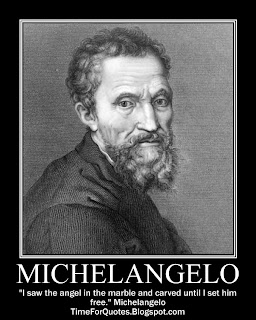"The roots of education are bitter, but the fruit is sweet." Aristotle
"The law is reason, free from passion." Aristotle
"Bashfulness is an ornament to youth, but a reproach to old age." Aristotle
"Both oligarch and tyrant mistrust the people, and therefore deprive them of their arms." Aristotle
"Bad men are full of repentance." Aristotle
"Youth is easily deceived because it is quick to hope." Aristotle
"Nature does nothing in vain." Aristotle
"We make war that we may live in peace." Aristotle
"The secret to humor is surprise." Aristotle
 |
| Marble bust of Aristotle. Roman copy after a Greek bronze original by Lysippus c. 330 BC. The alabaster mantle is modern. |
Aristotle (384 BC – 322 BC) was a Greek philosopher and polymath, a student of Plato and teacher of Alexander the Great. His writings cover many subjects, including physics, metaphysics, poetry, theater, music, logic, rhetoric, linguistics, politics, government, ethics, biology, and zoology. Together with Plato and Socrates (Plato's teacher), Aristotle is one of the most important founding figures in Western philosophy. Aristotle's writings were the first to create a comprehensive system of Western philosophy, encompassing morality, aesthetics, logic, science, politics, and metaphysics.
Aristotle's views on the physical sciences profoundly shaped medieval scholarship, and their influence extended well into the Renaissance, although they were ultimately replaced by Newtonian physics. In the zoological sciences, some of his observations were confirmed to be accurate only in the 19th century. His works contain the earliest known formal study of logic, which was incorporated in the late 19th century into modern formal logic. In metaphysics, Aristotelianism had a profound influence on philosophical and theological thinking in the Islamic and Jewish traditions in the Middle Ages, and it continues to influence Christian theology, especially the scholastic tradition of the Catholic Church. His ethics, though always influential, gained renewed interest with the modern advent of virtue ethics. All aspects of Aristotle's philosophy continue to be the object of active academic study today. Though Aristotle wrote many elegant treatises and dialogues (Cicero described his literary style as "a river of gold"), it is thought that the majority of his writings are now lost and only about one-third of the original works have survived.
Read more about Aristotle at Wikipedia
"Misfortune shows those who are not really friends." Aristotle
"At his best, man is the noblest of all animals; separated from law and justice he is the worst." Aristotle
"Pleasure in the job puts perfection in the work." Aristotle
"Character may almost be called the most effective means of persuasion." Aristotle
"No one would choose a friendless existence on condition of having all the other things in the world." Aristotle
"No one loves the man whom he fears." Aristotle
"A constitution is the arrangement of magistracies in a state." Aristotle
"Democracy is when the indigent, and not the men of property, are the rulers." Aristotle
"Therefore, the good of man must be the end of the science of politics." Aristotle
"Well begun is half done." Aristotle
"Change in all things is sweet." Aristotle
"If one way be better than another, that you may be sure is nature's way." Aristotle
"In all things of nature there is something of the marvelous." Aristotle
"He who is to be a good ruler must have first been ruled." Aristotle
"All virtue is summed up in dealing justly." Aristotle
"Education is an ornament in prosperity and a refuge in adversity." Aristotle
"It is best to rise from life as from a banquet, neither thirsty nor drunken." Aristotle
"My best friend is the man who in wishing me well wishes it for my sake." Aristotle
"The most perfect political community is one in which the middle class is in control, and outnumbers both of the other classes." Aristotle
"Bring your desires down to your present means. Increase them only when your increased means permit." Aristotle
"Education is the best provision for old age." Aristotle
"Friendship is a single soul dwelling in two bodies." Aristotle
"Friendship is essentially a partnership." Aristotle
"The worst form of inequality is to try to make unequal things equal." Aristotle
"The aim of art is to represent not the outward appearance of things, but their inward significance." Aristotle
"Mothers are fonder than fathers of their children because they are more certain they are their own." Aristotle
"Homer has taught all other poets the art of telling lies skillfully." Aristotle
"He who hath many friends hath none." Aristotle
"There is no great genius without a mixture of madness." Aristotle
"Whosoever is delighted in solitude is either a wild beast or a god." Aristotle
"Fear is pain arising from the anticipation of evil." Aristotle
"The gods too are fond of a joke." Aristotle
"Those that know, do. Those that understand, teach." Aristotle
"Probable impossibilities are to be preferred to improbable possibilities." Aristotle
"The energy of the mind is the essence of life." Aristotle
"Dignity does not consist in possessing honors, but in deserving them." Aristotle
"Piety requires us to honor truth above our friends." Aristotle
"Temperance is a mean with regard to pleasures." Aristotle
"It is the mark of an educated mind to be able to entertain a thought without accepting it." Aristotle
"Personal beauty is a greater recommendation than any letter of reference." Aristotle
"What is a friend? A single soul dwelling in two bodies." Aristotle
"I have gained this from philosophy: that I do without being commanded what others do only from fear of the law." Aristotle
"The whole is more than the sum of its parts." Aristotle
"Men acquire a particular quality by constantly acting in a particular way." Aristotle
"Quality is not an act, it is a habit." Aristotle
"The one exclusive sign of thorough knowledge is the power of teaching." Aristotle
"Thou wilt find rest from vain fancies if thou doest every act in life as though it were thy last." Aristotle
"A true friend is one soul in two bodies." Aristotle
"We must no more ask whether the soul and body are one than ask whether the wax and the figure impressed on it are one." Aristotle
"The ultimate value of life depends upon awareness and the power of contemplation rather than upon mere survival." Aristotle
"It is Homer who has chiefly taught other poets the art of telling lies skillfully." Aristotle
"All men by nature desire knowledge." Aristotle
"Without friends no one would choose to live, though he had all other goods." Aristotle
"Love is composed of a single soul inhabiting two bodies." Aristotle
"Even when laws have been written down, they ought not always to remain unaltered." Aristotle
"I count him braver who overcomes his desires than him who conquers his enemies; for the hardest victory is over self." Aristotle
"Men are swayed more by fear than by reverence." Aristotle
"The greatest virtues are those which are most useful to other persons." Aristotle
"The virtue of justice consists in moderation, as regulated by wisdom." Aristotle
"The best friend is the man who in wishing me well wishes it for my sake." Aristotle
"Plato is dear to me, but dearer still is truth." Aristotle
"You will never do anything in this world without courage. It is the greatest quality of the mind next to honor." Aristotle
"The young are permanently in a state resembling intoxication." Aristotle
"There was never a genius without a tincture of madness." Aristotle
"The educated differ from the uneducated as much as the living from the dead." Aristotle
"No excellent soul is exempt from a mixture of madness." Aristotle
"For though we love both the truth and our friends, piety requires us to honor the truth first." Aristotle
"Good habits formed at youth make all the difference." Aristotle
"Of all the varieties of virtues, liberalism is the most beloved." Aristotle
"The ideal man bears the accidents of life with dignity and grace, making the best of circumstances." Aristotle
"Republics decline into democracies and democracies degenerate into despotisms." Aristotle
"Most people would rather give than get affection." Aristotle
"No notice is taken of a little evil, but when it increases it strikes the eye." Aristotle
"We are what we repeatedly do. Excellence, then, is not an act, but a habit." Aristotle
"Wit is educated insolence." Aristotle
"All human actions have one or more of these seven causes: chance, nature, compulsions, habit, reason, passion, desire." Aristotle
"What it lies in our power to do, it lies in our power not to do." Aristotle
"A great city is not to be confounded with a populous one." Aristotle
"Hope is a waking dream." Aristotle
"Hope is the dream of a waking man." Aristotle
"The end of labor is to gain leisure." Aristotle
"It is unbecoming for young men to utter maxims." Aristotle
"All paid jobs absorb and degrade the mind." Aristotle
"Man is by nature a political animal." Aristotle
"Men create gods after their own image, not only with regard to their form but with regard to their mode of life." Aristotle
"We become just by performing just action, temperate by performing temperate actions, brave by performing brave action." Aristotle
"Wishing to be friends is quick work, but friendship is a slow ripening fruit." Aristotle
"The aim of the wise is not to secure pleasure, but to avoid pain." Aristotle
"Courage is a mean with regard to fear and confidence." Aristotle
"Happiness depends upon ourselves." Aristotle
"Poetry is finer and more philosophical than history; for poetry expresses the universal, and history only the particular." Aristotle
"The least initial deviation from the truth is multiplied later a thousandfold." Aristotle
"He who is unable to live in society, or who has no need because he is sufficient for himself, must be either a beast or a god." Aristotle
"It is not once nor twice but times without number that the same ideas make their appearance in the world." Aristotle
"A friend to all is a friend to none." Aristotle
"Those who excel in virtue have the best right of all to rebel, but then they are of all men the least inclined to do so." Aristotle
"The soul never thinks without a picture." Aristotle





















